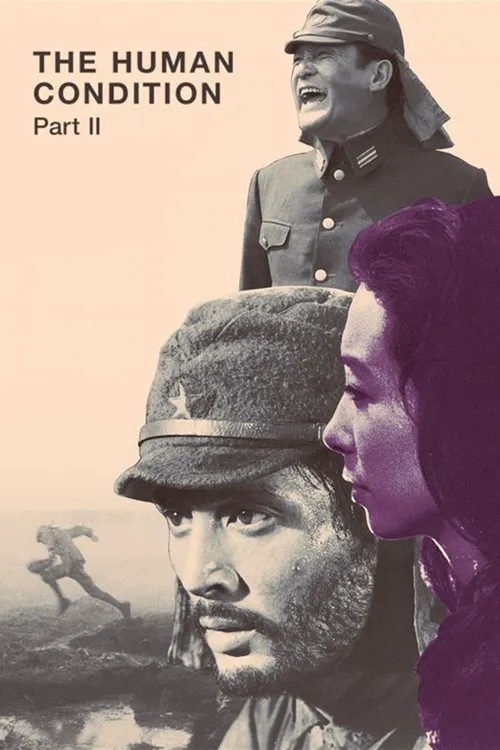The Human Condition II: Road to Eternity

Plot
The Human Condition II: Road to Eternity is the second installment in the epic drama trilogy by Japanese filmmaker Masaki Kobayashi, following the story of Kaji Kōichi, a young and idealistic man who finds himself at the forefront of a brutal and transforming war. The film picks up where the first installment left off, with Kaji being transferred to the Red Regiment, a unit notorious for its harsh discipline and cruel treatment of its recruits. From the outset, it is clear that Kaji has arrived in the Red Regiment with a mixture of trepidation and determination. He witnesses firsthand the callous and sadistic behavior of the veteran soldiers, who take great pleasure in breaking down the moral fiber of the new recruits. The abuse is endemic, with young men being subjected to physical and emotional torment on a daily basis. Despite the bleak atmosphere, Kaji remains committed to his ideals of human decency and compassion, even in the face of overwhelming adversity. One of the most striking aspects of the film is its portrayal of the psychological effects of military training and deployment. As Kaji navigates the treacherous landscape of the Red Regiment, he begins to experience the psychological strain of witnessing and enduring the cruelty around him. The recruits are constantly tested and pushed to their limits, and many of them begin to break down under the pressure. The film is particularly effective in conveying the sense of despair and hopelessness that pervades the unit, as Kaji and his fellow recruits are forced to confront the harsh realities of war. One of the most pivotal scenes in the film occurs when Kaji witnesses the mistreatment of a young recruit named Obara. The veteran soldiers subject Obara to a brutal beating, breaking his spirit and leaving him on the verge of collapse. Kaji is deeply moved by Obara's plight and decides to take action, intervening on behalf of the recruit and attempting to protect him from further harm. This act of defiance marks a turning point in Kaji's journey, as he begins to realize the full extent of the army's cruelty and corruption. As the story unfolds, Kaji's close friend Shinjô Ittôhei becomes increasingly disillusioned with the war effort and decides to defect to the Russian border. This decision marks a significant blow to Kaji, who is forced to confront the reality of his own circumstances and the true nature of the conflict. The film's depiction of Ittôhei's defection is particularly poignant, as it highlights the individual's desire for escape and redemption in the face of overwhelming odds. Meanwhile, the story takes a dramatic turn as Kaji finds himself at the front lines, facing a formidable Russian tank division. The battle is intense and chaotic, with soldiers on both sides fighting for their lives. As Kaji experiences the brutal reality of war firsthand, he is forced to confront the true horrors of conflict and the loss of innocence that accompanies it. The film's depiction of the battle is both harrowing and visually stunning, with Kobayashi's direction capturing the chaos and confusion of modern warfare. Throughout the film, Kobayashi's direction and the screenplay he co-wrote with Kiyoshi Yasujirô and Hideo Oba are marked by their unflinching portrayal of the human cost of war. The film does not shy away from the atrocities committed by soldiers on both sides, and its refusal to sentimentally romanticize the conflict is a testament to its uncompromising vision. Rather, the film presents a bleak and unvarnished depiction of war's dehumanizing effects, where the brutal treatment of soldiers and civilians alike is a stark reminder of humanity's darker impulses. As Kaji navigates the treacherous landscape of the front lines, the film's themes of morality, compassion, and sacrifice are brought into sharp relief. Despite the overwhelming odds against him, Kaji remains committed to his ideals, even in the face of brutal treatment and overwhelming adversity. His courage and resilience serve as a beacon of hope in a world that has lost its way, and his story is a powerful reminder of the importance of standing up for what is right, even in the most challenging of circumstances. In the end, The Human Condition II: Road to Eternity is a film about the transformative power of human experience, and the enduring legacy of courage and compassion in the face of overwhelming adversity. It is a testament to the enduring power of storytelling, where the experiences of one individual can speak to the collective humanity that unites us all.
Reviews
Recommendations




